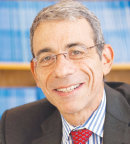
Philip D. Poorvu, MD

Eric P. Winer, MD, FASCO
“For patients with early-stage breast cancer, we’ve seen a significant decline in chemotherapy use over the past few years without a real change in evidence,” or in national guidelines and recommendations, reported Allison W. Kurian, MD, MSc, lead author of a study on chemotherapy recommendations and trends for stage I and II breast cancer.1 In the study of nearly 3,000 women with estrogen receptor–positive, HER2-negative breast cancer, the use of chemotherapy declined from 34.5% to 21.3% between 2013 and 2015. “This likely reflects a change in the culture of how physicians are practicing and a move toward using tumor biology to guide treatment choices,” shared Dr. Kurian, Associate Professor of Medicine and Health Research and Policy at Stanford University School of Medicine, California.
The study was published in the Journal of the National Cancer Institute,1 and the findings were reported widely by health media outlets. Dr. Kurian noted she was also contacted by general news media, such as The Wall Street Journal and Newsweek. The study “has received a fair amount of attention,” she told The ASCO Post. “Certainly, this is something other clinicians were interested to see. Many of us in practice have had the sense this was happening. To see it proven, particularly with this kind of magnitude of effect, was very interesting to many people.”
Patients Are Aware and Inquisitive
The study also found that the use of the 21-gene recurrence score increased only slightly among patients with node-negative disease, from 52.1% to 54.3% from 2013 to 2015. Among those with node-positive disease, recurrence score testing increased from 26.1% to 42.7%, accounting for one-third of the decline in chemotherapy use among node-positive patients.
“There is little doubt genomic assays that predict risk and possible chemotherapy benefit have played a major role in reduction of chemotherapy utilization. But genomic assays are only part of the story,” Philip D. Poorvu, MD, and Eric P. Winer, MD, FASCO, of the Department of Medical Oncology, Dana-Farber Cancer Institute, Boston, wrote in an accompanying editorial.2 “With the advent of targeted therapy for breast cancer, both oncologists and their patients appear less willing than in the past to take a toxic treatment for a very small benefit.”
As noted in the study report, “Patients may be increasingly concerned about the well-known and publicized toxic side effects of chemotherapy, particularly if oncologists express less enthusiasm about its benefits. This growing sea change in decision-making about chemotherapy is important for both oncologists and patients to recognize.”
“Patients are aware of the way things are changing and the notion that cancer medicine is becoming more and more personalized,” Dr. Kurian said. “Patients are hoping for equal benefit or more benefit with less harm, and they should be.” ■
DISCLOSURE: Drs. Kurian, Poorvu, and Winer reported no conflicts of interest.
REFERENCES

